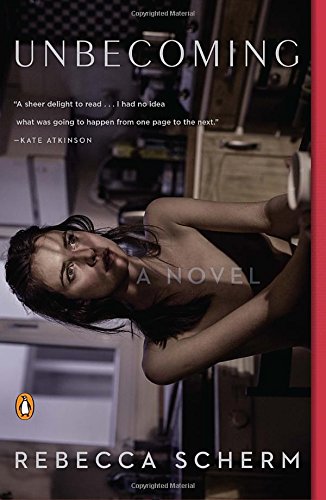 Reviewed by Ruth Latta
Reviewed by Ruth Latta
Unbecoming
by Rebecca Scherm
Penguin
Dec 2015, Paperback: 320 pages, ISBN-13:978-0143128311
In Thirteen Ways of Looking at the Novel, author Jane Smiley identifies various forms of communication from which a novel can borrow, including romance, polemic, joke, gossip, and history, to name just a few examples. Rebecca Scherm’s Unbecoming is a heist tale, a bildungsroman, a love story, and above all, a compelling psychological study of a likeable young woman with strong anti-social tendencies. As the novel progresses, Grace, the protagonist, not only behaves in “unbecoming” ways, but “unbecomes” the promising girl she once was. She grows in independence, strength and daring, but it is impossible to approve of her.
Unbecoming opens in Paris in the here-and-now, where Grace, calling herself “Julie”, is working in an atelier as an antique restorer. Reviewers have compared this novel to The Goldfinch because the antiques business is common to both books. While the world of antiques and fine art is a strong area of reader interest in both novels, Unbecoming has a different moral outlook than the one suggested by Donna Tartt in The Goldfinch. Unbecoming is more like Patricia Highsmith’s The Talented Mr. Ripley.
Unbecoming shifts from present to past, taking readers to small-town Garland Tennessee, to New York City, to Prague, and then to Paris. The narration is in the third person and limited to Grace’s point of view, taking us into her heart and mind and making us sympathise with her needs and fears even while worrying about the path she is taking.
Born to young unmarried parents, Grace spent her early years shuttled around among relatives. Eventually her parents marry, settle into suburban life, and produce twin sons, their pride and joy, leaving Grace odd-person-out. In seventh grade, she enters a warmer, kinder life through a friend, Riley Graham, a popular, goodhearted, handsome youth who eventually becomes her boyfriend and husband. The Grahams have more money and more love to share than Grace’s parents have. Mrs. Graham always wanted a daughter, and eagerly takes Grace under her wing. This affection is shown in several appealing scenes such as the one where Mrs. Graham gives her the attic guest bedroom to use when she visits, and another where she gets out her wedding dress and has Grace try it on.
Grace is drawn to Riley for many reasons, including his talent in art, and they dream of going to Europe to tour and paint. In their late teens, their relationship, which began when they were still just children, becomes troubled. Grace is secretly attracted to his buddy, Alls, but suppresses her feelings; she doesn’t want to break up with Riley and lose his family. Alls, like Grace, comes from an unhelpful family where higher education seems a big stretch.
At eighteen, Riley and Grace secretly marry. Soon after that she goes to study art at New York City, where she meets affluent fellow students and finds a part-time job with Mause Fine Arts Appraisal. The world of fine arts and antiques opens for her, and her courses suffer because of her interest and involvement in her work. Though still emotionally dependent on Riley, with whom she talks every day, she becomes more sophisticated in her artistic tastes, and sees the limitations of his technically competent representational pictures. An art student at Garland College, he wins the approval of one of his instructors, a gallery owner who likes his paintings of Garland buildings. These pictures sell well locally until the demand is exhausted. His friend Alls, who is attending Garland College on a fencing scholarship, comes to New York for a competition, and he and Grace spend the night together.
Grace flunks out, and when she returns to Garland, she and Riley find themselves stalled, with their dreams of Europe fading. He wastes his money on a used Jaguar. A variety of misfortunes dog them. Their inexpensive accommodation in a student house with Alls and another friend, Greg, is fraught with tension. Lack of money leads Grace to steal a collectible from an historic home, now a museum, and to plan a heist, involving all of them, from the same museum. To avert suspicion from Grace, because she has already stolen from the museum, Riley finds money for her to take a summer course in Prague, promising to join her there later. There she is robbed of the money from the sale of a stolen painting. In contrast to the protagonist of The Goldfinch, who is haunted by the painting he stole, Grace feels no sentiment for the one she has lifted, but is upset over losing the money.
Early in the novel we are told of Riley’s and Alls’s arrest and imprisonment for the heist, so the suspense lies in our yearning for the details and our curiosity as to how Grace was involved. In Paris, one of Grace/Julie’s co-workers, an antiques restorer with a chequered past, accuses Grace of being an incorrigible liar who is unable to love. This remark seems unfair at first, but nags readers as Grace commits more thefts at the atelier. We keep reading to find out how she will get caught and what the consequences will be, but Unbecoming is not the sort of crime story in which justice is ultimately restored. Grace’s co-worker was wrong about her inability to love, though, as shown in a poignant scene as the novel draws to a close.
Unbecoming‘s characters are fully-rounded creations, and the novel is so smoothly written, suspenseful and well-organized, that it is hard to believe it is Rebecca Scherm’s first novel. I intend to recommend it to my book club.
About the reviewer: Ruth Latta’s most recent novel, Most of All, is available on Amazon Kindle. Visit her books blog at http://ruthlattabooks.blogspot.com